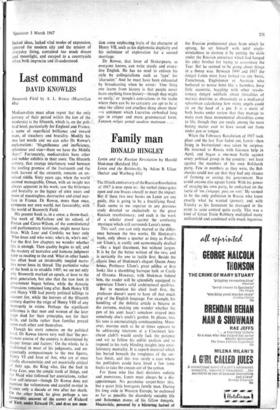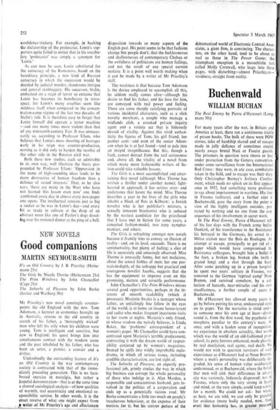Family man
RONALD HINGLEY Lenin and the Russian Revolution by Harold Shukman (Batsford 35s) Lenin and the Bolsheviks by Adam B. Ulam (Seeker and Warburg 63s)
The fiftieth anniversary of the Russian Revolution of 1917 is now upon us: the verbal sluice-gates open and one braces oneself to meet the impact. But if these two new books on Lenin are any guide, this is going to be a fructifying flood. Each seems to me superior to any previous study devoted so exclusively to the great Russian revolutionary; and each is the work of a scholar proof against the confusing mystique which still surrounds Lenin's name.
This said, one can only marvel at the differ- ence between the two works. Dr Shukman's book, only about a quarter as long as Profes- sor Ulam's, is coolly and economically drafted --like a legal document, but without jargon. It is by far the better written of the two, and is certainly the one to tackle first. Beside the classic lines of Shukman's elegant Queen Anne house, Professor Ulam's great edifice at first looks like a shambling baroque hulk or Castle of Otranto. However, with Shukman behind him, the reader will be splendidly equipped to appreciate Ulam's solid architectural qualities.
But to mention his chief fault first, the professor doesn't seem to have all that much grip of the English language. For example, his handling of the definite article is bizarre in the extreme, making one wonder whether the pen of his aunt hasn't somehow strayed into somebody else's uncle's garden. In places, too, his tone is excruciatingly condescending. More- over, morons such as he at times appears to be addressing (matrons at a Cincinnati lun- cheon club?) would surely lack the patience and wit to follow his subtle analysis and to respond to his truly blinding insights into revo- lutionary mentality. It is superb material which lies buried beneath the roughness of the sur- face finish, and this was surely a case where the publishers could have hired a few tame hacks to take the creases out of the syntax.
For those who like their dictators sadistic and monstrous, Lenin must always be a dis- appointment. No paranoiac carpet-biter this, but a quiet little bourgeois family man. During his long exile in Western Europe, he eschewed as far as possible the disorderly sociable life and Bohemian mores of his fellow Emigres. Meanwhile, powered by a blistering hatred of
the Russian professional class from which he sprang, he set himself with total single- mindedness to destroy it by putting the skids under the Russian autocracy which had hanged his elder brother for trying to assassinate the Tsar. But he seemed to be going about things in a funny way. Between 1900 and 1917 tho émigré Lenin must have looked (to any Swiss, Frenchman, Englishman or Austrian who bothered to notice him) like a harmless, busy little eccentric, haggling with other revolu- tionary émigré oddballs about trivialities of marxist doctrine as obsessively as a mediaeval schoolman calculating how many angels could sit on the head of a pin. It is a merit of both books under review that they manage to make even these monumental absurdities come to life, though they are surely among the most boring matter ever to have oozed out from under pen or tongue.
When the February Revolution of 1917 took place and the last Tsar faded out, Lenin—then living in Switzerland—was taken by surprise. He returned to Russia with German help in April, and began a one-man battle against every political group in the country : not least against the members of his own Bolshevik party. Few in numbers as they were, the Bol- sheviks could not see that they had any chance of forming or seizing the government. Nor could anyone else wept Lenin. With his power of swaying his own party, he embarked on the tactic of `on s'engage; puis on volt.' He seemed to be the only politician in Russia who knew exactly what he wanted (power); and with Trotsky as his lieutenant he managed in the event to seize control quite easily. This was a kind of Great Train Robbery multiplied many millionfold and combined with much ingenious
confidence-trickery. For example, in backing the dictatorship of the proletariat, Lenin's sup- porters quite failed to notice that in his vocabu- lary 'proletariat' was simply a synonym for `Lenin.'
As can now be seen, Lenin substituted for the autocracy of the Romanovs, based on the hereditary principle, a new kind of Russian autocracy in which the succession would be decided by judicial murder, slanderous intrigue and general skulduggery. His successor, Stalin, embarked on a reign of terror so extreme that Lenin has becomes its beneficiary in retro- spect; for Lenin's many cruelties seem like mildness itself when compared to the concen- tration-camp regime of the last two decades of Stalin's rule. It is therefore easy to forget that Lenin himself did operate a terror machine —and one many times more violent than that of any nineteenth-century Tsar. It was unneces- sarily so, according to Professor Ulam, who believes that Lenin's mass shooting of hostages early in his reign was counter-productive, serving as it did only to harden the resolve of the other side in the Russian civil war.
Both these new studies, each so admirable in its own way, well illustrate the thesis pro- pounded by Professor Ulam: 'Oppression in the name of high-sounding ideas tends to be more destructive of human freedom than a defence of vested interests.' That, as he also says, 'there are many in the West who have not learned this lesson even now' one finds confirmed every day in almost every newspaper one opens. The intellectual remains just as big a sucker as he was in Lenin's day—and every bit as ready to salivate at the drop of an abstract noun like one of Pavlov's dogs drool- ing over his notional dinner at the ping of a bell.



































 Previous page
Previous page